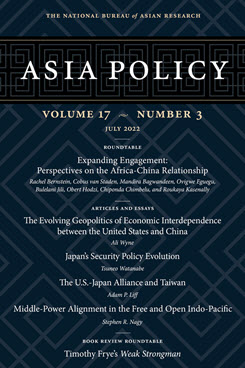Middle-Power Alignment in the Free and Open Indo-Pacific
Securing Agency through Neo-Middle-Power Diplomacy
This article explores how middle powers in the Indo-Pacific are engaging in a new type of diplomacy, one that includes lobbying, insulating, and rulemaking in the realms of security, trade, and international law, to protect their national interests from Sino-U.S. strategic competition.
EXECUTIVE SUMMARY
MAIN ARGUMENT
The change in the power balance associated with China’s re-emergence as Asia’s largest economy has brought concerns about Sino-U.S. strategic competition and raised questions about U.S. leadership in the Indo-Pacific region among many U.S.-aligned middle powers, such as Australia, Japan, Canada, and India. Specific challenges that China is creating include fomenting instability in the maritime domain, fracturing the openness of the emerging digital economy, and practicing coercive economic behavior, to which middle powers are especially vulnerable. Therefore, the Indo-Pacific’s middle powers are aligning to adapt to these changing dynamics and transforming their diplomacy and cooperation into “neo-middle-power diplomacy.” This new type of diplomacy is proactive and engages in behavior that includes lobbying, insulating, and rulemaking in the realms of security, trade, and international law. It aims to ensure that middle powers’ interests are not deleteriously affected by the Sino-U.S. rivalry.
POLICY IMPLICATIONS
- Like-minded middle powers should actively seek out alignment partners inside and outside the region based on a convergence of interests. U.S. involvement is preferred but not a prerequisite for alignment and cooperation.
- Middle powers should focus cooperation on key areas based on the synergy of their respective comparative advantages. Ideally, these would stress capability-based contributions, such as intelligence gathering, rather than the capacity of the resources available for cooperation. Examples include regularized humanitarian and disaster-relief activities; maritime cooperation in the East and South China Seas, Taiwan Strait, and Indian Ocean; and joint transits in the Indo-Pacific.
- Middle powers should prioritize their interests in free trade and “data free flow with trust” in the digital economy to both provide economic incentives to emerging states in the region and develop trade safety-net agreements that will allow them to support each other when subject to economic coercion.
Stephen R. Nagy is a Senior Associate Professor at the International Christian University in Tokyo (Japan). He holds fellowship positions with the Canadian Global Affairs Institute, the MacDonald Laurier Institute, the East Asia Security Centre, and the Japan Institute for International Affairs. He is also the Director of Policy Studies at the Yokosuka Council for Asia-Pacific Studies.
About Asia Policy
Asia Policy is a peer-reviewed scholarly journal presenting policy-relevant academic research on the Asia-Pacific that draws clear and concise conclusions useful to today’s policymakers. Asia Policy is published quarterly in January, April, July, and October and accepts submissions on a rolling basis. Learn more


